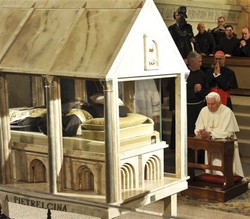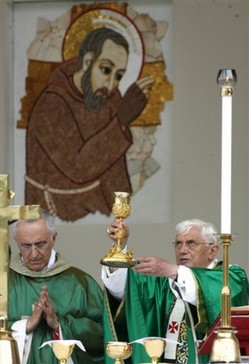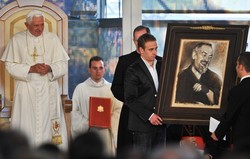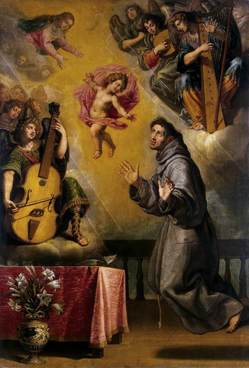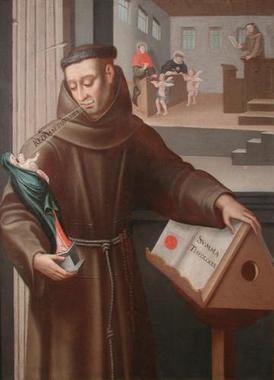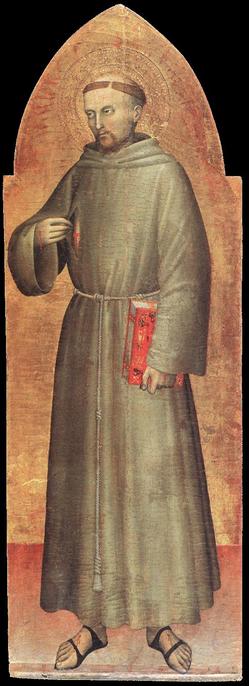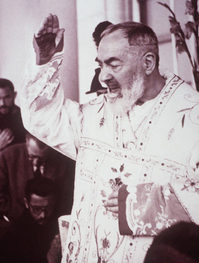As part of the inaugural observances for the Year of the
Priest, Pope Benedict made a pilgrimage to and celebrated the Sacrifice of the Mass Sanctuary of Our Lady of the Graces at San Giovanni Rotondo, resting place of Saint Padre Pio of Pietrelcina. In the days following the feast of the
Sacred Heart of Jesus and with devotion to Our Lady in mind, the Pope recalled that the fruit of Padre Pio’s close bond with the Sacred Heart of Christ and His mother, Mary, inspired him to found the House for the Relief of Suffering: “All his life and his apostolate took place under the maternal gaze of the Blessed Virgin and by the power of her intercession. Even the House for the Relief of Suffering he considered to be the work of Mary, ‘Health of the sick.'”
Born Francisco Forgione, at the age 23 the obscure Capuchin Franciscan friar was said to have received the gift of the sacred stigmata. On Saint Pio‘s hands and side the wounds were similar to the stigmata, or the wounds of Jesus Christ’s crucifixion, according to Christian belief. The Pope proposed to us another model for priests by giving the example of this friar from Pietrelcina: “A simple man of humble origins, ‘seized by Christ‘ (Phil 3:12) … to make of him an elected instrument of the perennial power of his Cross: the power of love for souls, forgiveness and reconciliation, spiritual fatherhood, effective solidarity with the suffering. The stigmata, that marked his body, closely united him to the Crucified and Risen Christ.”
Relating today’s gospel with the life of Saint Pio, His
Holiness also said to the gathered faithful:
The solemn gesture of calming the stormy sea is clearly a
sign of the lordship of Christ over the negative powers and it induces us to think of His divinity: “Who is He – ask the disciples in wonder -that even the wind and the sea obey him?” (Mk 4:41). Their faith is not yet steadfast, it is taking shape, is a mixture of fear and trust; rather Jesus trusting abandonment to the Father is full and pure. This is why He sleeps during the storm, completely safe in the arms of God – but there will come a time when Jesus will feel anxiety and fear: When His time comes, He shall feel upon himself the whole weight of the sins of humanity, as a massive swell that is about to fall upon Him. Oh yes, that shall be a terrible storm, not a cosmic one, but a spiritual one. It will be Evil’s last, extreme assault against the Son of God…. In that hour, Jesus was on the one hand entirely One with the Father, fully given over to him – on the other, as in solidarity with sinners, He was
separated and He felt abandoned.
Remaining united to Jesus, [Padre Pio] always had his sights on the depths of the human drama, and this was why he offered his many sufferings, why he was able to spend himself in the care for and relief of the
sick – a privileged sign of God’s mercy, of his kingdom which is coming, indeed, which is already in the world, a sign of the victory of love and life over sin and death. Guide souls and relieving suffering: thus we can sum up the mission of Saint Pio of Pietrelcina: as the servant of God, Pope Paul VI said of him.”
At one point in his address the Benedict spoke to the
Franciscan friars and those connected with the spiritual groups linked to Saint Pio and anyone else, the Pope affirmed: “The risks of activism and secularization are always present, so my visit was also meant to confirm fidelity to the mission inherited from your beloved Father. Many of you, religious and laity, are so taken by the full duties required by the service to pilgrims, or the sick in the hospital, you run the risk of neglecting the real need: to listen to Christ to do the will of God. When you see that you are close to running this risk, look to Padre Pio: In his example, his sufferings, and invoke his intercession, because it obtains from the Lord the light and strength that you need to continue his mission soaked by love for God and fraternal charity.”
Following Mass, the Holy Father led the faithful in the Angelus prayer (the great prayer recalling the Incarnation) calling to mind Padre Pio’s devotion to the Blessed Virgin Mary. Benedict remarked, “To the intercession of Our Lady and St Pio of Pietrelcina I would like to entrust the Special Year for Priests, which I opened last Friday on the Solemnity of the Sacred Heart of Jesus. May it be a privileged opportunity to highlight the value of the mission and holiness of priests to serve the Church and humanity in the third millennium!”
Watch the video clip
Another video explaining more of Padre Pio’s life
